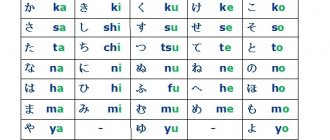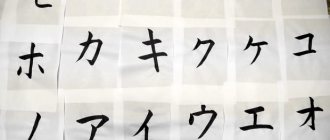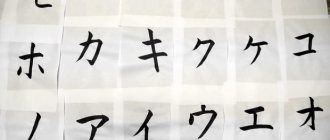1st person pronouns
Let's start with 1st person pronouns. Japanese has more of them than other languages. This is due to the fact that there are pronouns that are used only by men or, conversely, only by women, and pronouns can also differ in the degree of politeness.
私 (watashi) is a universal pronoun for the 1st person. It can be used by both men and women. Sometimes the same pronoun is pronounced as わたくし (watakushi) - this form is used when they want to sound more polite, mainly in formal settings, as well as when meeting for the first time. There is also a female version, which sounds like あたし (atashi), it is used only by girls, girls, and it sounds a little childish.
There are quite a few ways to form the plural of personal pronouns. All of them are built on the addition of various plural suffixes at the end of a word. Suffixes can be: がた (gata), たち (tachi), ら (ra).
To form the plural of the pronoun 私 (watashi), use the suffix たち (tachi). The resulting word is 私たち (watashitachi), “we.” This word is also universal in its use.
私は学生です。Watashi wa gakusei desu.
I am a student.
私たちはこの家に住んでいます。Watashitachi wa kono ie ni sunde imasu.
We live in this house.
Men can also use 僕 (boku) about themselves if they want to sound modest, and 俺 (ore) in a more casual, friendly environment. 俺 (ore) should not be used when communicating with superiors; it is mainly used when communicating with friends, family, equals or lower social status. When communicating with superiors, it is more appropriate to say 僕 (boku) - it is no coincidence that one of the meanings of this character is servant. The speaker thus emphasizes that he is below the interlocutor. The plurals of these are 僕ら (bokura) and 俺ら (orera), respectively. These pronouns are used mainly by men, although there are cases when girls also refer to themselves as 僕 (boku), but this is slang and rather the exception to the rule.
Boku wa kono kaisha ni tsutomete orimasu.
I work for this company. (Very polite).
俺ら、腹減ったぞ。Orera, hara hetta zo.
We're hungry. (Colloquial).
If we talk about female pronouns of the 1st person, then it is also worth mentioning the word うち (uchi). This pronoun is not used as often in Tokyo, but is more common in the Kansai region. The word うち (uchi) itself can be translated as “house, inside, ours.” It has no plural form.
Young children often use their own name instead of first person pronouns. For example:
健太は遊びに行きたいよ。Kenta wa asobi ni ikitai yo.
Kenta wants to go play.
我々 (wareware) – “we”, a pronoun used by the heads of organizations and the military. This is “we”, which emphasizes that a person speaks as a representative, a leader of a community.
Ware-ware wa uchuujin da.
We are aliens.
In addition, older people may use わし silently. To be honest, I have never heard this from modern Japanese, but it often occurs in anime and historical dramas.
If there is communication between two companies, then we will denote ourselves, our side, our company with the word こちら (kochira). For example:
こちらから連絡いたします。Kochira kara renraku itashimasu.
We (from our side) will contact you.
Another thing to consider is that the Japanese often omit first person pronouns. This is a little unusual. For example, when talking about ourselves, we will say this: “My name is Anya. I am 23 years old. I live in Moscow. I study at University…". Every sentence includes “I” or “me, me.” If we say the same thing in Japanese, we will use 私 (watashi) only in the first sentence, and in subsequent sentences we will omit this word.
basic information
To begin with, it is worth saying that there are a great many pronouns in the Japanese language. They all differ in that they are used in different situations by different people. In order to choose the appropriate pronoun at a particular moment, you need to determine several points for yourself .
First, you need to answer a purely biological question: are you a man or a woman? Despite the fact that in modern language the boundary between male and female speech is blurred, it is still quite clearly visible. In addition, the Japanese language does not have a gender category, so male and female speech can only be distinguished by the use of certain vocabulary, grammatical structures, including pronouns.
Secondly, what is your status in relation to your interlocutor? Are you friends, colleagues or student and teacher? There are several levels of politeness in the Japanese language, and the use of pronouns is associated with them. Don't forget that if you choose the wrong word, you can insult or offend a person. Also, sometimes men and women address each other differently.
Thirdly, of course, it is worth considering the place where you are talking . Even if in everyday life you are best friends with someone, you should not show the personal side of your relationship at an official conference. However, this should be familiar to us from the example of our own culture.
Naturally, the choice of pronouns, for example, by your interlocutor, may be determined not only by the above considerations. It’s worth taking into account age, the desire to show off, and the desire (we hope this won’t happen!) to offend you.
Pronouns in Japanese 2nd person
あなた (anata) translates to “You” and is a singular pronoun. The plural is あなたたち (anatatachi), or, if we want to sound more polite, then あなたがた (anatagata). The word あなた (anata) should not be used too often in speech. Strictly speaking, it is appropriate to use it only when you do not know the name of your interlocutor. In other cases, instead of あなた (anata), they usually use the surname or first name of the interlocutor plus an address suffix, for example: 田中さん (Tanaka-san). Yes, it sounds a little strange if translated into Russian literally. 田中さんはどこに住んでいますか。(Tanaka-san wa doko ni sunde imasu ka.) – “Where does Tanaka live?” (and we ask this directly from Tanaka, as if calling him in the 3rd person). Literally, this can be translated as “Tanaka, where do you live?” And the Japanese use this turn of phrase much more often, which is あなた (anata).
Anata no namae wa nan desu ka.
What is your name?
Yamada-san wa koko ni yoku kimasu ka.
Yamada, do you come here often?
Also, the word あなた (anata) is what a Japanese wife usually uses to address her husband. In this case, it can be translated as “you” or “dear”.
There is also a shortened form あんた (anta), which is more common in colloquial speech.
"You" in Japanese is 君 (kimi). This pronoun is used much more often by men, usually in relation to girls or inferiors. 君 (kimi) is often used by superiors in relation to subordinates. Women use this pronoun much less often. The same rule applies here: usually the Japanese do not say “you” or “you”, but call the interlocutor by first or last name. The plural form of this pronoun is 君たち (kimitachi) - “you”.
君を守りたい。Kimi wo mamoritai.
I want to protect you.
There are also ruder ways to say "you" in Japanese. Firstly, it is お前 (omae). This is what we say to a person we don’t really respect. Men often resort to this pronoun. The plural form of this pronoun is お前ら (omaera).
And a very rude way to say “you” would be 貴様 (kisama). It is interesting that initially this was a very polite address used in the court environment. But over time, on the contrary, it became abusive. Agree, when we are angry with someone, we can also resort to a similar stylistic turn, something like: “maybe Your Majesty should iron some more shoelaces?!” 貴様 (kisama) is even harsher than お前 (omae), so if you are not going to challenge your interlocutor to a mortal fight, you should not say it.
Another swear word for “you” is てめえ (temee). It can also often be heard in anime when a hero challenges an opponent or when he is very angry with his interlocutor.
By analogy with こちら (kochira), which means “we, our side,” in business communication the word そちら (sochira) is used to mean “you, your side.”
Sochira no tsugou no ii jikan wo ochiete kudasaimasen ka.
Could you tell me what time is convenient for you?
Thus, depending on the 2nd person pronoun that we choose, we can show either our respectful attitude towards the interlocutor (I repeat, the most successful way is to use not “you” or “you” as address, but the name of the interlocutor), or complete disregard, as in the case of お前 (omae) and 貴様 (kisama).
Demonstrative and interrogative pronouns
Demonstrative words, functioning as pronouns, adjectives or adverbs, are divided into four groups. Words starting with co-
indicate something close to the speaker (the so-called
proximal
demonstrative).
Those beginning with tak-
indicate separation from the speaker or closeness to the listener (
medial
), and those beginning with
a-
indicate greater distance (
distal
).
Question words used in questions begin with do-
.[3]
Demonstrations are usually written in hiragana.
| Romaji | Hiragana | Kanji | Meaning |
| Korea | これ | 此れ | this thing / these things (next to the speaker) |
| sick | それ | 其れ | that thing/those things (near the listener) |
| are | あ れ | 彼れ | this thing / these things (away from the speaker and the listener) |
| Dore | どれ | 何れ | which things)? |
| Kochira or Kotchi | こちら / こっち | 此方 | this/here (next to the speaker) |
| Sochira or Sochi | そちら / そっち | 其方 | what/there (near the listener) |
| achira or atchi | あちら / あっち | 彼方 | this / there (away from the speaker and listener) |
| Daughter or daughter | どちら / どっち | 何方 | What is where |
Pronouns in Japanese 3rd person
The most neutral and universal pronoun for the 3rd person is あの人 (anohito). It is translated both as “he” and as “she”, that is, it is used regardless of the gender of the person we are talking about. The plural of it is あの人達 (anohitotachi), “they.” If we want to sound more polite, we can use あの方 (anokata), which also translates to either “he” or “she.” And the plural of it is あの方々 (anokatagata), “they”.
For example:
あの人は佐々木さんです。Anohito wa Sasaki-san desu.
He is Sasaki.
あの方々は大使です。Ano kata-gata wa taishi desu.
These gentlemen are ambassadors.
Additionally, 彼 (kare) is used to indicate “he”. It is usually used in relation to closer people, friends. It can also mean "boyfriend, lover." The plural would be 彼ら(karera), “they (men).”
彼はまだ若い。Kare wa mada wakai.
He's still young.
To say "she" you can use 彼女 (kanojo). This word is also used to refer to one's girlfriend.
For example:
昨日彼女と喧嘩した。Kinou kanojo to kenka shita.
Yesterday I had a fight with my girlfriend.
The plural form of 彼女 (kanojo) is 彼女たち (kanojotachi), “they (girls).”
Suffixes
Suffixes are added to pronouns to make them plural.
| Romaji | Hiragana | Kanji | Speech level | Notes |
| tachi | たち | 達 | informal; Examples:
| Can also be attached to names to indicate that person and the group they are in ( Ryuichi-tachi = "Ryuichi and Friends"). |
| kata , gata | かた, がた | 方 | formal (e.g. あなた方, anata-gata ) | More polite than 達tachi . Gata is Rendaku form. |
| domo | ど も | 共 | modest (eg 私ども, watakushi-domo ) | Causes some slander towards said group, so can be rude. Domo is Rendaku's form. |
| ra | ら | 等 | informal (e.g. 彼ら, Karera .俺ら, Ore-ra .奴ら, Yatsu-ra .あいつら, aitsu-ra ) | Used with informal pronouns. Often used with hostile words. Sometimes used for light humility, like domo (e.g. 私ら, Watashi-ra ) |
Other pronouns[ | ]
They are given in interrogative form, but interrogative and positive pronouns differ only in the presence/absence of a question mark.
| Relative pronouns | Demonstrative pronouns | ||||
| Pronoun | Kanji | Polivanov | Pronoun | Kanji | Polivanov |
| Who? Whose? | 誰? 誰の? | Dare? Dare but? | When? | 何時? | Itsu? |
| What is the price)? How many years)? | 幾ら? 幾つ? | Ikura? Ikutsu? | This (closer to the speaker than to the interlocutor) This (closer to the interlocutor than to the speaker) That | この その あの | Kono Sono Ano |
| What? Whose? | 何?何の? | Nani? Nani but? | Which? Such? | どんなの? そんなの? | Donna but? Sonna but? |
| Why? From what? | なぜ?何で? | Naze? Nanda? | Where? Where? | どこから? どこに? | Doko kara? Doko ni? |
Notes[ | ]
- Maynard, Senko K: "An Introduction to Japanese Grammar and Communication Strategies", page 45. The Japan Times, 4th edition, 1993. ISBN 4-7890-0542-9
- TRANS Nr. 16: Rika Ito (St. Olaf College, MN USA): BOKU or WATASHI: Variation in self-reference terms among Japanese children
- Article "Assi" (Japanese). Explanatory dictionary of the Japanese language
. Access date: March 25, 2011. - Article "Watti" (Japanese). Explanatory dictionary of the Japanese language
. Access date: March 25, 2011. - Article "Wagahai" (Japanese). Explanatory dictionary of the Japanese language
. Access date: March 25, 2011. - Article "Warawa" (Japanese). Explanatory dictionary of the Japanese language
. Access date: March 25, 2011. - Article "Gosei" (Japanese). Explanatory dictionary of the Japanese language
. Access date: March 25, 2011. - Article "Yo" (Japanese). Explanatory dictionary of the Japanese language
. Access date: March 25, 2011. - Article "Maro" (Japanese). Explanatory dictionary of the Japanese language
. Access date: March 25, 2011. - Article "Midomo" (Japanese). Explanatory dictionary of the Japanese language
. Access date: March 25, 2011. - Article "Shōsei" (Japanese). Explanatory dictionary of the Japanese language
. Access date: March 25, 2011. - Article "Soregashi" (Japanese). Explanatory dictionary of the Japanese language
. Access date: March 25, 2011. - Article "Sessha" (Japanese). Explanatory dictionary of the Japanese language
. Access date: March 25, 2011. - Article "Yatsugare" (Japanese). Explanatory dictionary of the Japanese language
. Access date: March 25, 2011. - Article "Nanji" (Japanese). Etymological Dictionary of the Japanese Language
. Retrieved March 25, 2011. Archived March 30, 2012. - Article "Onushi" (Japanese). Explanatory dictionary of the Japanese language
. Access date: March 25, 2011. - Article "Sonata" (Japanese). Explanatory dictionary of the Japanese language
. Access date: March 25, 2011. - Article "Gojin" (Japanese). Explanatory dictionary of the Japanese language
. Access date: March 25, 2011. - Article "Tin" (Japanese). Explanatory dictionary of the Japanese language
. Access date: March 25, 2011.











